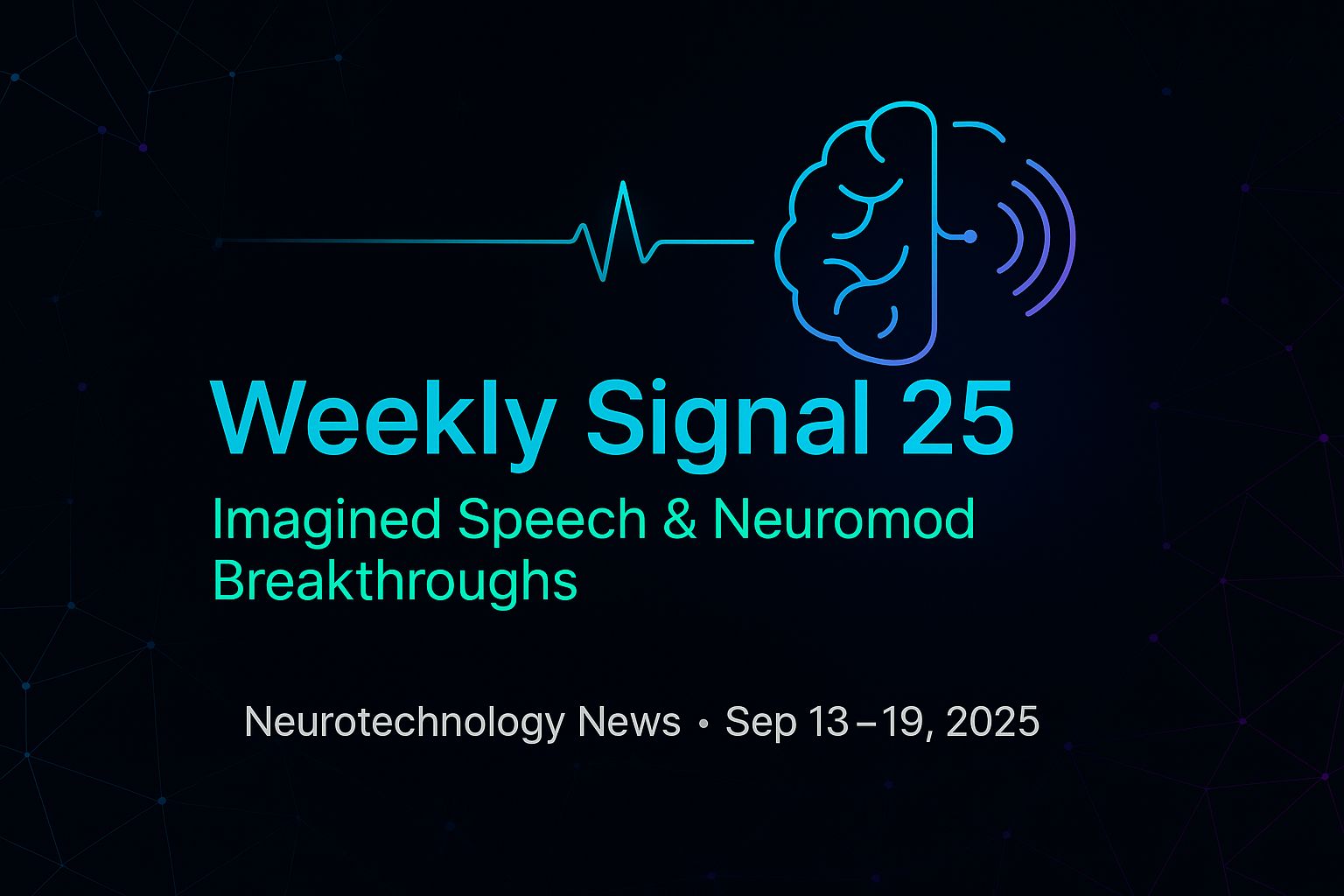Table of Contents
🧠 Weekly Signal
BCI Speech & Therapy Advances
Neurotechnology News | Sep 13–19, 2025
Let's cut through the noise this week!
This week, we saw brain‑computer interface (BCI) research move closer to restoring speech and durable migraine relief, while regulators cleared faster neuromodulation protocols and a minimally invasive urinary‑incontinence implant. Meanwhile, industry expansion continued with graphene‑based BCIs. Bottom line: neurotech is compressing time to benefit.
🧠 SCIENCE & CLINICAL TRIALS
🟢 Neuralink prepares imagined speech BCI trial
Neuralink will launch a U.S. clinical trial in October to decode imagined speech from participants with paralysis, converting thought into text via its brain implant. Company president D.J. Seo said the study follows FDA Breakthrough Device designation and builds on implant experience with 12 people.
💡 Big Picture: Successful decoding of imagined speech could restore communication for locked‑in patients and broaden neuroprosthetic applications.
🟢 Implantable migraine device delivers year‑long relief
Published: Sep 16, 2025
Read more ➡️NeurologyLive / PR Newswire
ShiraTronics reported 12‑month follow‑up data from its RELIEV‑CM pilot study: patients experienced average reductions of 9.6 monthly headache days and 9.6 monthly migraine days, sustained quality‑of‑life improvements and no unanticipated adverse events. The implant targets the occipital and supraorbital nerves and builds on earlier 12‑week results.
💡 Big Picture: Durable, dual‑target neuromodulation may provide a long‑term alternative for chronic migraine sufferers as pivotal trials begin.
🟢 Accelerated six‑day deep‑TMS protocol cleared
Published: Sep 16, 2025
Read more ➡️ Medical Economics / BrainsWay News
The U.S. FDA approved BrainsWay’s accelerated Deep Transcranial Magnetic Stimulation protocol for major depressive disorder. The protocol condenses the acute phase to six days, with five ten‑minute sessions per day, and a multicenter randomized trial showed it reduced depression scores by ~19 points with 87.8 % response and 78 % remission rates—comparable to the four‑week standard.
💡 Big Picture: Shorter, intensive treatment schedules could make non‑invasive brain stimulation more accessible and improve adherence.
💼 INDUSTRY & STARTUPS
🟢 Medtronic wins approval for ankle‑implanted Altaviva device
Published: Sep 19, 2025
Read more ➡️ Medical Economics / Medtronic
The FDA approved Medtronic’s Altaviva implantable tibial neuromodulation device for urge urinary incontinence. Inserted near the ankle without sedation or imaging, patients leave the clinic with therapy activated. The device has a 15‑year battery and recharges in about 30 minutes; pivotal TITAN‑2 trial data showed significant reductions in urgency episodes and incontinence events.
💡 Big Picture: A long‑life, minimally invasive implant could expand neuromodulation beyond overactive bladder into mainstream urology care.
🟢 INBRAIN opens U.S. office and partners with Mayo Clinic
Published: Sep 15–16, 2025
Read more ➡️Mass Device / Parc Cientific de Barcelona
Graphene‑based brain‑computer interface firm INBRAIN Neuroelectronics launched a U.S. subsidiary with offices in Boston and on the West Coast and entered a non‑exclusive know‑how collaboration with Mayo Clinic. The collaboration will evaluate INBRAIN’s precision BCI‑Tx platform in IRB‑approved settings, and the Boston office will support clinical trials and commercialization. INBRAIN has raised $124 million to date.
💡 Big Picture: Expansion into the U.S. and partnership with a major health system signal growing momentum behind graphene‑based BCIs and their path to market.
🏛️ POLICY & ETHICS
🟢 Neuralink’s Canadian trial prompts ethics debate
Published: Sep 19, 2025
Read more ➡️Yahoo / UHN Canada
The University Health Network in Toronto implanted Neuralink devices in two patients with cervical spinal‑cord injuries as part of the CAN‑PRIME trial, which aims to enroll up to six participants. Bioethicists and physicians questioned the partnership due to Elon Musk’s political controversies and the company’s transparency. UHN said the study was approved by regulators and aims to improve patient autonomy.
💡 Big Picture: Collaborations between hospitals and high‑profile tech firms highlight the need for clear governance and trust when experimental BCIs enter clinical practice.
🎯 Community Challenge
Ready to take neurotech to the next level? Share your insights, projects, ideas, our upcoming list of NeuroHacks, or your own groundbreaking work—and watch the inspiration ripple across the community!
How to Participate
Follow HackTheNeuron
Create a Post
Show us what you’re working on—DIY projects, research breakthroughs, or even your latest neurotech musings.Use #Neurotech
This helps your ideas reach fellow enthusiasts and potential collaborators.Mention @HackTheNeuron
Tag us directly in your post so we never miss your entry—and we’ll amplify your work across our entire NeuroCircuit community!
Why Join?
Boost Your Reach: Tap into a niche but fast-growing community for extra visibility.
Build Your Network: Connect with researchers, developers, and curious tinkerers who share your passion.
Shape Neurotech’s Future: Your project or insight could spark the next big breakthrough—or inspire someone else’s.
We can’t wait to see your creativity in action! Fire up X, LinkedIn, Facebook, Instagram, or TikTok, and spread the word. Let’s spark innovation together!
🚀Recruit More Neurohackers
Your referrals are the engine that drives our community forward. Share your unique referral link with friends, colleagues, or fellow neurotech enthusiasts—and watch us grow together!
Spread the Word: Copy your personal referral link and post it on social, forums, or in emails.
Unlock Exclusive Perks: Every friend who subscribes through your link brings you closer to special rewards—insider insights, private Discord access, early project previews, and more.
Be the Catalyst: The more you share, the stronger our network becomes. Help us build the ultimate neurotech hub—one referral at a time!
✍️Help Us Improve
Your input is what will make The NeuroCircuit and Hack The Neuron better. Let us know what you’d like more of—and what we can do differently.
Share Your Ideas: Tell us which topics, features, or formats you’d love to see next.
Spot the Gaps: Let us know if anything’s missing or unclear in our content and community tools.
Shape the Experience: Whether it’s new challenges, tutorials, or platform features, your suggestions guide our roadmap.


